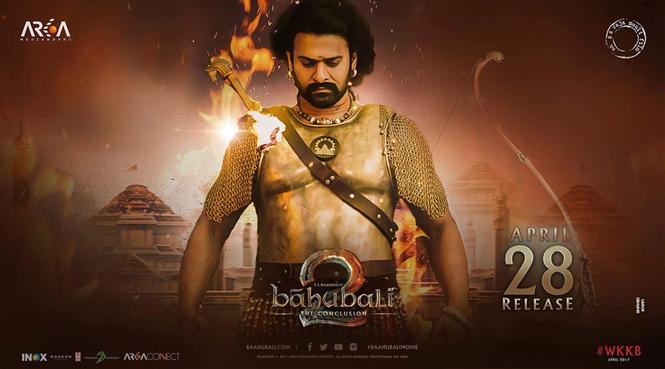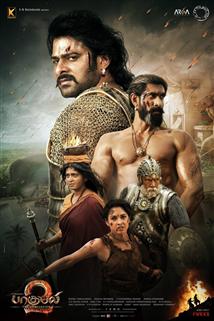An open letter to Rajamouli, who has bust the myths about ancient Hindu kingdoms via Baahubali 2
Prakash Ramesh (The article was originally published in Satyavijayi)
In his open letter to director SS Rajamouli, Chennai-based software professional Prakash reveals how the maker has been successful in portraying the ancient Hindu kingdoms as they were, and in the process, also been able to break many myths.
Dear S S Rajamouli Ji,
The release of your movie “Bahubali 2 – The Conclusion” has created tremors across the Indian Film Industry. This has happened so much so that the Indian Movie Industry has been divided into two eras; Pre Bahubali Era and Post Bahubali Era.
With collections grossing well over Rs 700 crores in the past five days, this movie will create a big dent to all the Khan glory of Bollywood or a Rajini block buster of Kollywood. A Telugu dubbed movie in Hindi/Tamil beating the mainstream hero from the local language is quite a challenge and you have accomplished it.
But what one fails to understand is the much bigger dent you have created in the mindset of pseudo liberals in India. This has been done tactfully in such a subtle way, that it will completely change the way an average Hindu thinks about his culture and history.
For the past several decades, Hindus have been subjected to movies of social messages ridiculing every religious practice that are performed. These movies have not only tried to alter our history, but also on many occasions made us feel shameful of our own culture by glorifying certain misconstrued ideologies. There are many myths that you have debunked through this movie and I would like to point them out to our audience.
Aryan-Dravidian Myth:
The Political scenario of South Indian states, especially Tamil Nadu, is surviving on a thin string of Aryan-Dravidian migration theory. By showcasing the worship of Ganesha in the very first scene, and using an elephant to celebrate Vijayadashami (Dussehra), you have debunked this fake Aryan migration theory.

The worshiping of Lord Rama and Lord Shiva has always been a pan Indian culture. Only a certain select group of individuals have tried to glorify Ravana as the Lord of Dravidians, that too for their own political convenience. Let the Aryan and fake Dravidian Gods, created by them, save their political career after this movie.
Devasena – Bahubali’s better half:
Devasena, the female warrior is an embodiment of spirit, power and control which is more than enough proof to showcase how many women-folk have lead their lives in our soil.
The part of the movie where Devasena rejects her proposal for marriage from a much powerful Mahishmati Kingdom speaks a lot for her character. Her rejection of this proposal was not only supported but encouraged by her brother, King of Kunthala Kingdom. The rejection of this marriage proposal by Devasena shows the world that women in India had the first right to select or reject a partner.

The scene where she walks right on Bahubali’s shoulder to get onto the boat, goes on to show the way women-folk were treated in India. Apart from this, the scene where Devasena chops off the fingers of a man for he tried to touch her inappropriately, is the icing on the cake.
Unfortunately, Pseudo Feminists of India will hate you for you this movie, since you have rendered them jobless.
Dharma over Written Laws:
It is not just a mere coincidence that we have been called as the followers of Sanatana Dharma also known as Eternal Dharma. Hinduism has always been known for propagating this concept of Sanatana Dharma, even if it means standing up against your own guru.
The scene where Bahubali stands up to his mother Sivagami Devi shows the real meaning of Dharma wins over written laws. His mother’s teachings were eternal dharma for Bahubali and for him dharma took precedence over his emotions.
Intellectuals in India can burn all the books they want but they cannot take away Sanatana Dharma from our land.
Democracy over Monarchy:
The rise of Bhallala Deva to become the King of Mahishmati made everyone think that he has complete control in the functioning of the Kingdom. There is one scene in the film where Bhallala Deva suggests to his father Bijjaladeva, “I will not able to take complete control of the Kingdom until Sivagami Devi supports me”
This scene tells us that if one becomes a monarch, there are still many complex protocols that he/she must follow before taking a major decision. Council of Ministers, Advisers and Advisory Committees have played a keen role in our Hindu Kingdoms.
This just imprints the fact that British were not the bringers of democracy to this soil, it has always been following a Democratic style of functioning.
Technology in Hindu Kingdoms:
If one has managed to visit the ruins of Hampi, he/she would see how superior was the Vijayanagar Kingdom in terms of technological advancement. The use of telescope by Bhallala Deva in one scene reminded me of the pinhole camera effect that I had seen in the Virupaksha temple at Hampi.

All the kingdoms showcased by you have used advanced weaponry (Catapults, Chariot Designs) and complex battle formations during war. These scenes have showed us how much advanced were our ancestors in terms of skill and knowledge. Not just in war craft but the way Bahubali helps locals overcome their day to day problems with technology is a sight for sore eyes.
Sadly, you have again put to shame all our Leftist Historians who have spent an eternity debunking our ancestor’s great minds.
Nationalism for All:
Our school History textbooks teaches us, that the reason why British could conquer all our Hindu kingdoms very easily was because ancient India was split up into several smaller kingdoms. The allegiance people gave to their kingdoms was much more than what they gave to land of this country.
Although this might be true to a certain extent, this doesn’t mean there was no Nationalism or unitary factors for all these kingdoms. Our ancestors loved our soil and were ready to give their lives for it, it is an undeniable fact. Kattappa’s faithfulness to his kingdom and soil stands testimony for this.
The “Mahishmati Anthem” in both the Bahubali films shows how much the Hindu culture made us swear allegiance to our soil rather than a specific king or family. The reverberations created by this Anthem gave goosebumps to all people who heard this in the theater.
Mercy for traitors:
The final scene where Bijjaladeva passed on the crown to Devasena, who in turn crowned her son Mahendra Bahubali marks a very important fact.
Hindu Kingdoms have constantly shown mercy, even to the cruelest traitors. This has been our biggest advantage and disadvantage. We have suffered in the hands of Mughals because of this act of mercy but at the same time, it is this ability to give mercy which makes us bigger than other religions.
Apart from debunking all these theories, the grandeur with which you have projected the Hindu Kingdoms, developed a new language for the Kalakeya tribe*, presented the way of life of the people – even to the minutest detail to the type of clothes they wear; speaks volumes of the ground work that has gone behind this movie.
*(“Kiliki” the language which was used by Kalakeya tribe in Bahubali, consists of 750 words with 40 grammar rules and even prepared several reference documents)
I really hope that an equal or in fact more groundwork goes behind “Mahabharata” movie that you are planning to take in future. Not only will your next movie create a big influence for Hindus across the world but it will establish this epic as part of the Indian History.
Regards,
Prakash R
(This article was first published by the author on his website, Satyavijayi on May 3, and it has been reproduced here with his permission )
MovieCrow doesn't endorse personal opinions expressed by the visitor/author.

